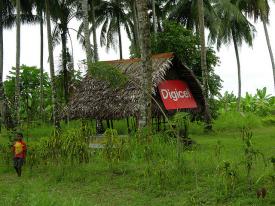Solar sites to connect people, boost business on PNG
 A new initiative will help Papua New Guinea residents stay a little bit more connected, with a telecom company rolling out solar-powered phone charging stations around the island community.
A new initiative will help Papua New Guinea residents stay a little bit more connected, with a telecom company rolling out solar-powered phone charging stations around the island community.
The plan will see 30 solar charging units given to the owners of small shops and community centres, who will be allowed to charge a small fee for residents to charge their devices. The operators must maintain and support their units in exchange for the fee.
Only ten per cent of PNG is connected to an electricity grid, so it is a perfect site for the roll out of decentralised energy devices, such as small independent solar units.
The initiative has been undertaken by New Zealand telecommunications firm Digicel, with the backing of the NZ government and the World Bank's International Finance Corporation.
Gavin Murray, the Corporation’s Pacific Manager said it would offer a great small business opportunity to some enterprising islanders.
“Somebody has control of the box and they open up the box and the box basically looks like one of those phone recharging sites that you see in the airport these days where you can just go and plug your phone in and it has all the different connections for different phone types,” he said.
“So effectively all it is is a solar panel that's generating power that's stored in batteries which are inside the box and there's about enough capacity for two to three days of recharging once the batteries are full.”
The pilot sites hope to service thousands of people living nearby. The units also provide a large LED streetlight, which has advantages of its own.
“So now having effectively a street light means people can meet safely and they can use it for other activities and events as well,” Mr Murray says.
Smartphones may seem like the last concern for residents of the idyllic islands, but there are a number of distinct advantages for people from all walks of life.
“There are stories around small farmers or small fishermen who will ring ahead or text ahead to the market to find out what's in short supply and what the prices are before they make the effort to go to market,” Murray said
He says other uses include; “as a flashlight or a light during childbirth and also for health and education, even doing homework by the flashlight on a mobile phone so the ability to recharge that phone ... is a great benefit to the community.”







 Print
Print